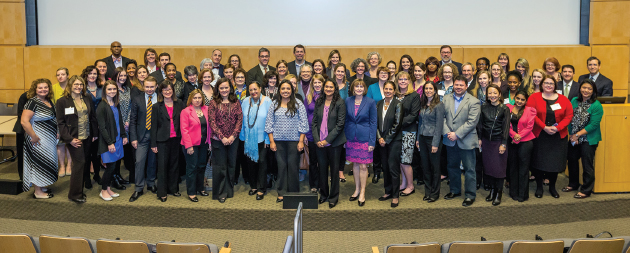In February 2015, the President’s Cancer Panel reported that human papillomavirus (HPV) vaccination uptake among boys and girls was falling drastically short of target rates, posing “a serious but correctable threat to progress against cancer.” In response, the National Cancer Institute (NCI) awarded short-term grants to 18 NCI-designated cancer centers for research and collaborations that would enhance HPV vaccination uptake.
On the heels of this funding, and to facilitate discussions of common approaches and goals between centers on a national level, Anna Giuliano, PhD, and Susan Vadaparampil, PhD, MPH, of the Moffitt Cancer Center, Tampa, Florida, spearheaded a conference of experts and stakeholders: “Increasing HPV Vaccination in the United States: A Collaboration of NCI-Funded Cancer Centers.” The conference was attended in January 2015 by representatives from cancer centers and others interested in driving the national conversation on HPV vaccine uptake.
Many Voices Heard
Having so many educated and forward-looking voices in one room had incredible value, said Dr. Vadaparampil, a senior member in the Health Outcomes and Behavior Program at Moffitt. “We heard not only from representatives of all the NCI-designated cancer centers but from leadership at the American Cancer Society, NCI, and Centers for Disease Control and Prevention. We learned there are many ways we can bolster vaccination rates, but we all agreed that where we need to start is in supporting provider recommendations. That is the target for increasing vaccine acceptance,” she said.
Discussions focused on shared measures, common deliverables, challenges in vaccination communication, and strategies to identify and engage key stakeholders. Among the overarching themes were the need to discuss the importance of HPV vaccination as a cancer prevention method (rather than focusing on sexual transmission of the virus itself), the need for a gender-neutral approach to vaccination, and the need to account for diversity in target populations, Dr. Vadaparampil said.
As a result of meeting together, a number of working groups were formed; participants will be sharing study instruments online to ensure consistency of data in crafting a national HPV vaccination overview. A follow-up meeting will be hosted by MD Anderson Cancer Center in September 2015 to review the first year of grant funding, revisit issues that were raised, address new concerns, and highlight successes among teams around the nation working toward HPV vaccination to prevent cancer. ■
Disclosure: Drs. Giuliano and Vadaparampil reported no potential conflicts of interest.




